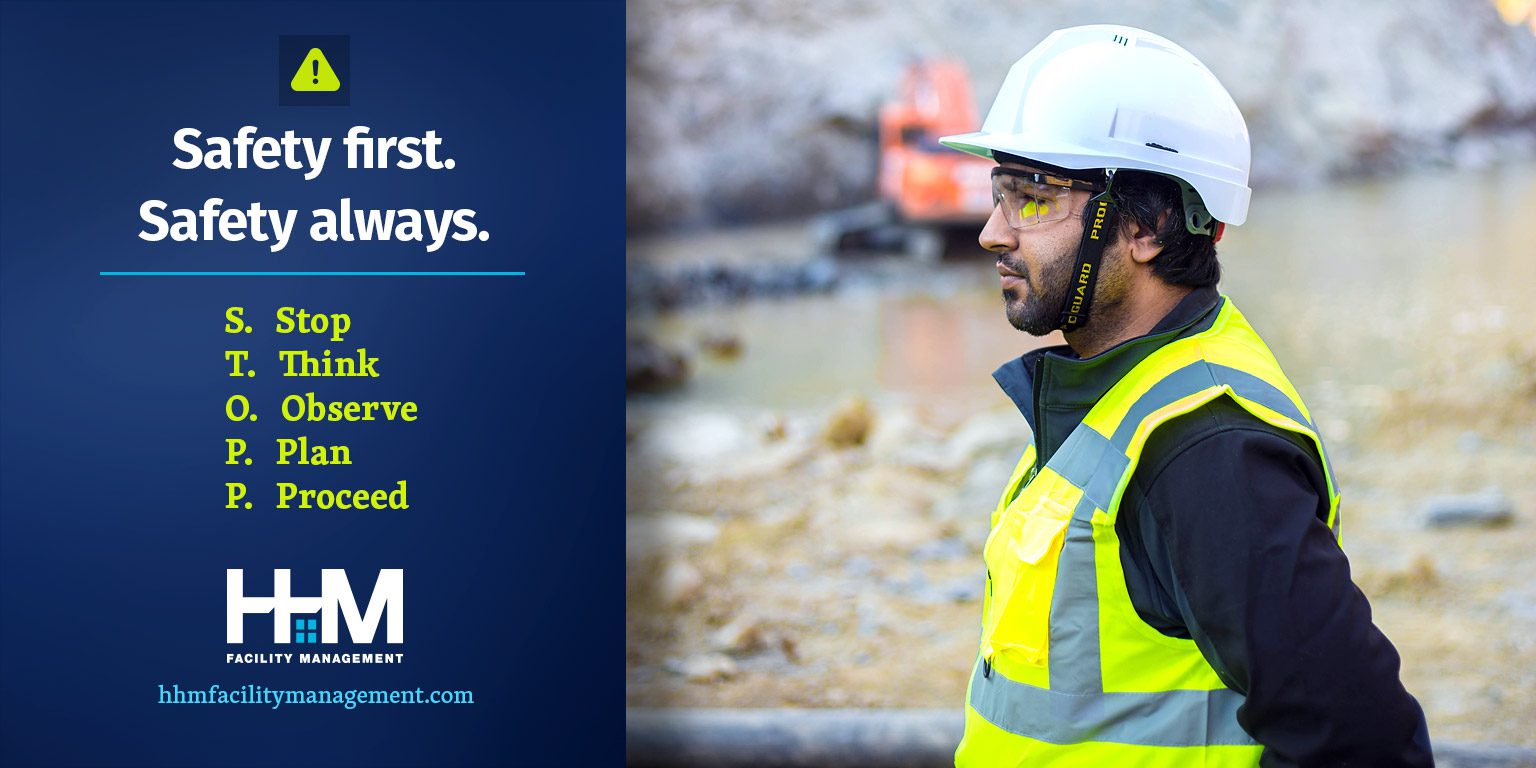Safety first. Safety always.
Post by Tim Morris, HHM EHSS Manager

Safety is a fundamental building block of HHM Facility Management’s success. Eliminating the fear of personal injury allows our team to focus on other important aspects of their jobs, such as improving quality and performance. When our teams are faced with adversity, we encourage them to use the STOPP method:
S – Stop before you act, don’t rush into a situation without considering the risks against the benefits.
T – Think about what you are about to do. What is the right way to safely accomplish the task?
O – Observe the situation and the surrounding environment What are the risks and how do I reduce them?
P – Plan. Develop your plan to reduce the risk and decide how to best implement the plan.
P – Proceed with Safety. Supervise continuously and constantly look for ways to improve.
CUSTODIAL/MAINTENANCE EMPLOYEE SAFETY RULES
Please heed the safety rules and lifting techniques that follow to protect yourself and fellow employees; otherwise, your quality of life or someone else’s may change “in a moment.”
GENERAL SAFETY
• Make safety the first consideration in every situation.
• When picking up a load, evaluate whether or not you need help or special equipment. Do not lift a load alone if you have any doubt about your ability to lift it. Use proper lifting techniques to prevent injury.
• Keep your work area clean and free of loose objects, stumbling (including office equipment wires) or slipping hazards, rubbish, etc.
• Be aware of walking surfaces and their condition. Extra care may be required to prevent an accident.
• Never leave an unsafe condition unguarded or unmarked, even temporarily.
• Learn the location of fire extinguishers and know how to use them.
• Always post “wet floor” signs when using a liquid floor cleaning method.
• Before using any chemical make sure you have read the Material Safety Data Sheet and know how to use, store and dispose of it.
• Chemicals and equipment should be stored in accordance with the OSHA Regulations and Fire Code Regulations rules, with no exception.
• Cleaning chemicals shall be stored in accordance with the instructions on the container and the material data safety sheets.
• DO NOT store acids and bases or oxidizers and reducers in the same cabinet due to the possibility of extreme violent reaction between the two.
• Store potentially flammable chemicals in approved containers and areas.
• Never store chemicals in electrical, mechanical, or boiler rooms.
• Keep chemicals away from sources of heat or sunshine.
• Chemical storage areas should not be crowded and should have a systematic, easy-to-reach arrangement.
• Never transfer/store chemicals in unlabeled or incorrectly labeled containers.
• Always check hand and power tools and electrical cords before using.
• Never use a tool or cord that is damaged or defective.
• Never leave tools or equipment lying on the floor in walking paths or exits.
• All company-owned tools should be cleaned, and in good working condition before storing.
• Get first aid for every scratch, cut, and burn, no matter how small. Untreated minor injuries may develop into serious injuries.
• Every accident or injury, no matter how small, must be reported to your supervisor immediately. He/she will then report the accident or injury to the department supervisors.
• Do not attempt to operate the equipment you do not understand.
• Wear adequate shoes with full protection of the heel and toes and slip-resistant soles. Never wear shoes with worn heels or shoes that are open. Wear steel-toed shoes where required.
• When backing a vehicle into a confined area, always have another adult as a guide.
• Before beginning the workday, check all lights and tires on the vehicle.
• Seatbelts must be worn while operating company vehicles.
• Make sure you know where fire extinguishers are located and are fully charged and operational.
• Emergency exits must be kept clear at all times.
• Never park or stack anything in front of fire extinguishers, electrical panels, and/or fire doors.
• Never pour flammable liquids down drains or sewers.
• Dispose of all flammable waste rags in metal containers with lids and in an approved area.
• Change your clothing immediately should they become soaked with any flammable liquid.
• Always wear comfortable and adequate clothing on the job. This includes not only well-fitting clothing but also adequate shoes to protect your feet from hazardous materials.
• Protective gear should be worn at all times, in all areas, indoors or outdoors, in hazardous jobs.
–––––
Tim Morris is a resilient professional with 30 years of operational, safety, and security leadership experience. He is a United States Army veteran who was deployed to the Horn of Africa, Iraq for combat operations, and stateside providing force protection in support of the Global War on Terror. He is recognized for his in-depth experience conducting target analysis and vulnerability assessments and developing proactive mitigating controls to prevent injury and the loss of life. During his tenure at Bass Pro Shops Hospitality Group, he led the safety and security team successfully during multiple large-scale VIP events such as six PGA Tour Champions Tournaments, Wonders of Wildlife Gala, and Christmas in the Bahamas.
He is a certified Situational Awareness Specialist Advanced Practitioner (SAS-AP), CARVER Assessment Professional (CCAP), High Adversity Resilience Coach (CHAReC), Workplace Violence Threat Specialist (WVTS). His passion is to assist, protect and defend leaders, companies, and organizations so they can thrive through disruptions and advance despite adversity.
Have questions or need a custom solution? Contact us today.